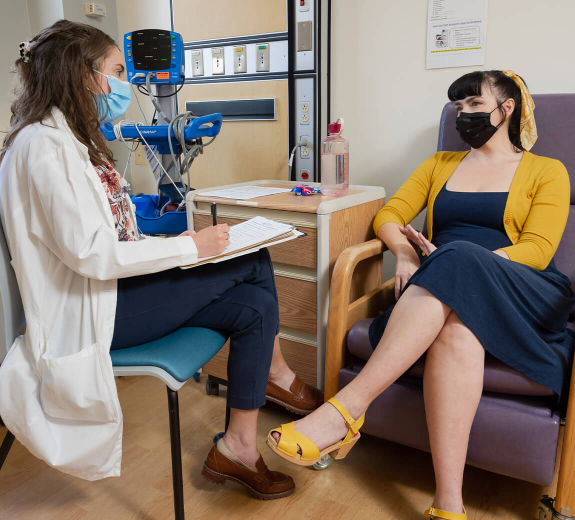
New Hope In IBD Clinical Research
Exciting and innovative new treatments for inflammatory bowel diseases (IBD), which includes Crohn’s disease and ulcerative colitis, are now being offered in clinical research trials at Virginia Mason supported by BRI. “There is a rich pipeline of exciting new drugs and approaches that is bringing us steady progress in finding better solutions to fit individuals and their diseases,” says Michael Chiorean, MD, director of the IBD Center of Excellence and Digestive Disease Institute research at Virginia Mason. “Scientists and immunologists are discovering new molecules and pathways to target in IBD. This results in more options for people who can’t find a drug that works for them, become immune to the drugs that used to work for them or experience difficult side effects from their current drug. The new medications are more targeted, which may work better and may have fewer side effects.”
In some cases, the latest drugs can be life changing. “One of our research participants who hasn’t responded to any previous therapy went on a clinical trial, responded to the drug and is off steroids for the first time in years,” says Dr. Chiorean. “Another participant could only work the graveyard shift because he had to go to the bathroom every 20 minutes. With the clinical research drug, he went into remission, received a daytime job with a promotion and moved out of state. Now he chooses to fly back to Seattle for his follow-ups.”
Crohn’s disease and ulcerative colitis are autoimmune diseases in which the body’s overactive immune system attacks the intestines, resulting in intestinal inflammation, abdominal pain, diarrhea and bleeding.
Clinical research in IBD with Drs. Chiorean, Lord and Boden is working to make advancements in three areas:
Better Drugs
“The efficacy of current drugs for inflammatory bowel disease is about 30 to 35 percent, so we are looking for more and better drugs to help patients,” says Dr. Chiorean. “Crohn’s disease and, to some extent, ulcerative colitis are probably many different diseases that we tend to lump together, so there are not just one or two drugs that will solve the problem for everyone. Since these are individualized diseases, we need individualized approaches including diverse classes of drugs and probably combinations of drugs. Among many interesting therapeutics in clinical trials, we have a new drug called mongersen. In the last 30 years, all efforts in IBD were aimed at turning off the overactive immune system to stop it from damaging the intestines. Mongersen is the first drug that turns on the regulatory part of the immune system to boost certain cells that deactivate the attacking immune cells.” Dr. Chiorean and his team select clinical research trials based on their patient population. They conduct regular reviews of their practice to evaluate the type of patients, disease type and severity they encounter to identify the most critical needs that are not satisfied by currently approved therapies and may be offered through a clinical trial.
1. Improved Drug Delivery
Some clinical studies test the ways drugs are delivered to see if they can be more convenient for patients while still being as effective. For instance, if a drug is given as an infusion, requiring a person to come to the clinic once a month for several hours, it is tested as an injection taken daily. A drug given as a weekly or monthly injection may be tested as an oral pill. If the drug is more convenient, it will be easier for patients to take it regularly as prescribed, thereby increasing compliance, improving their quality of life and their symptoms.
2. Personalized Medicine
At BRI, Dr. Lord leads research to find ways to best match an individual with the best medicine right away without trial and error. This research is being conducted by using the Inflammatory Bowel Disease Biorepository, a large, confidential sample repository containing tissue and blood specimens from people with IBD who are willing to provide health information to support scientific research. Scientists use these samples and data in laboratory analysis to better understand the causes and long-term health effects of IBD. They can also explore better treatment options for patient care and identify targets for novel therapies.
3. Joining Clinical Studies
Dr. Chiorean encourages people who have not found a good medication for their IBD to consider joining a clinical trial. “People are sometimes hesitant about trying a new drug, because of the false assumption that they are ‘guinea pigs’ for the drug. While these are indeed ‘new drugs,’ all of them have been previously tested for years in the lab and in human studies to make sure they are safe,” he explains. “Our participants are monitored very closely and provided excellent care throughout the study and follow-up. People need to remember that virtually all breakthroughs—including the blockbuster drugs used today in IBD such as infliximab, adalimumab, vedolizumab and ustekinumab—were once clinical trial drugs; today they are helping hundreds of thousands of people with these disorders.
“Nowadays, this is an extremely dynamic field,” adds Dr. Chiorean, “which changes at a pace that I have never seen before in my entire career. This is exciting for us and provides a great deal of hope for our patients who have struggled with these often very debilitating diseases.” Dr. Chiorean has assembled a team of experienced research coordinators who help him conduct these clinical trials. “They are the unsung heroes,” he says. “They keep the wheels spinning, and we are lucky to have some of the best in the field working for us.”
To learn more about IBD clinical studies, contact the DDI research coordinator at 206-341-1021 or join our Clinical Research Registry to be notified of appropriate studies.
To learn more about joining a BRI biorepository, call 877-202-5200 or email biorepository@ BenaroyaResearch.org.
Originally published in BRING IT ON newsletter - Fall 2017
Immuno-what? Hear the latest from BRI
Keep up to date on our latest research, new clinical trials and exciting publications.


